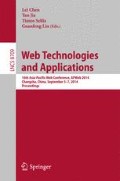Abstract
Interdisciplinary scientific research (IDR) has been obtained more and more attention in recent years. This paper studies the problem of which papers are important for IDR. According to the citation relationships among papers, we focus on the influential papers where novel methods or idea are proposed and these new methods are used in different research areas. A two-stage approach is given to find influential papers for interdisciplinarity based on citation diversity. Firstly, the topic distribution of each paper is estimated by training Latent Dirichlet Allocation (LDA) topic model on the papers repository. Then the diversity of cited papers and citing papers are designed to measure the paper’s influence. The effectiveness of the proposed approach is demonstrated through the extensive experiments on a real dataset and a synthetic dataset.
Access this chapter
Tax calculation will be finalised at checkout
Purchases are for personal use only
Preview
Unable to display preview. Download preview PDF.
References
Mccallum, A.K.: Mallet: A machine learning for language toolkit, http://www.cs.umass.edu/~ccallum/mallet
Interdisciplinarity, http://en.wikipedia.org/wiki/Interdisciplinary
Bache, K., Newman, D., Smyth, P.: Text-based measures of document diversity. In: Proceedings of the 19th ACM SIGKDD International Conference on Knowledge Discovery and Data Mining, pp. 23–31. ACM (2013)
Griffiths, T.L., Steyvers, M.: Finding scientific topics. PNAS 101, 5228–5235 (2004)
Huang, J., Ling, C.X.: Using auc and accuracy in evaluating learning algorithms. IEEE Transactions on Knowledge and Data Engineering 17(3), 299–310 (2005)
Kajikawa, Y., Mori, J.: Interdisciplinary research detection by citation indicators. In: IEEM 2009, pp. 84–87. IEEE (2009)
Larivière, V., Gingras, Y.: On the relationship between interdisciplinarity and scientific impact. Journal of the American Society for Information Science and Technology 61(1), 126–131 (2010)
Porter, A.L., Chubin, D.E.: An indicator of cross-disciplinary research. Scientometrics 8(3), 161–176 (1985)
Porter, A.L., Cohen, A.S., Roessner, J.D., Perreault, M.: Measuring researcher interdisciplinarity. Scientometrics 72(1), 117–147 (2007)
Porter, A.L., Rafols, I.: Is science becoming more interdisciplinary? measuring and mapping six research fields over time. Scientometrics 81(3), 719–745 (2009)
Rafols, I., Meyer, M.: Diversity and network coherence as indicators of interdisciplinarity: case studies in bionanoscience. Scientometrics 82(2), 263–287 (2010)
Rao, C.R.: Diversity and dissimilarity coefficients: a unified approach. Theoretical Population Biology 21(1), 24–43 (1982)
Stirling, A.: A general framework for analysing diversity in science, technology and society. Journal of the Royal Society Interface 4(15), 707–719 (2007)
Tang, J., Zhang, J., Yao, L., Li, J., Zhang, L., Su, Z.: Arnetminer: Extraction and mining of academic social networks. In: KDD 2008, pp. 990–998 (2008)
Wang, Y., Tong, Y., Zeng, M.: Ranking scientific articles by exploiting citations, authors, journals, and time information. In: AAAI (2013)
Winslett, M.: Christos faloutsos speaks out: on power laws, fractals, the future of data mining, sabbaticals, and more. ACM SIGMOD Record 34(4), 85–89 (2005)
Zhai, C.: Statistical language models for information retrieval. Synthesis Lectures on Human Language Technologies 1(1), 1–141 (2008)
Author information
Authors and Affiliations
Editor information
Editors and Affiliations
Rights and permissions
Copyright information
© 2014 Springer International Publishing Switzerland
About this paper
Cite this paper
Wang, K., Sha, C., Wang, X., Zhou, A. (2014). Based on Citation Diversity to Explore Influential Papers for Interdisciplinarity. In: Chen, L., Jia, Y., Sellis, T., Liu, G. (eds) Web Technologies and Applications. APWeb 2014. Lecture Notes in Computer Science, vol 8709. Springer, Cham. https://doi.org/10.1007/978-3-319-11116-2_30
Download citation
DOI: https://doi.org/10.1007/978-3-319-11116-2_30
Publisher Name: Springer, Cham
Print ISBN: 978-3-319-11115-5
Online ISBN: 978-3-319-11116-2
eBook Packages: Computer ScienceComputer Science (R0)

